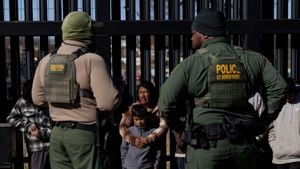The State of Qatar participated prominently in the High-level Segment of the Conference on Disarmament, held on February 24, 2025, in Geneva. Headed by HE Secretary-General of the Ministry of Foreign Affairs Dr. Ahmed bin Hassan Al Hammadi, Qatar’s delegation expressed the country's firm commitment to disarmament and international peace.
During the conference, Dr. Al Hammadi articulated Qatar’s fixed national policy on disarmament, emphasizing the necessity of addressing global crises and security threats. He stated, "Qatar has adopted a fixed national policy and clear positions on disarmament issues, based on its commitment to its responsibilities toward maintaining international peace and security.” This declaration reflects Qatar's role as an advocate for disarmament, as it has joined numerous international agreements and is actively updating its legislation related to weapons of mass destruction to align with its global obligations.
Al Hammadi outlined various unprecedented risks posed by rising global tensions, nuclear modernization, and the integration of technologies, including artificial intelligence, within military frameworks. "The increasing crises and conflicts witnessed by the international environment...are unprecedented risks,” he asserted, calling for the Conference on Disarmament to overcome its three-decade paralysis and demonstrate political will and flexibility.
He urged fellow nations to engage collaboratively and develop balanced, comprehensive work plans aimed at negotiating treaties for comprehensive nuclear disarmament. This includes transparent and irreversible destruction methods, governed by effective verification systems. Such measures, he argued, are necessary to restore confidence in the conference’s capability to support and promote global peace and security.
Highlighting Qatar’s proactive approach, he welcomed the Pact for the Future, which seeks to build frameworks for a world devoid of nuclear, chemical, and biological weapons. His recommendations included establishing nuclear-weapon-free zones and revitalizing the role of the United Nations within the disarmament discourse.
Underscoring the urgency of current geopolitical issues, Al Hammadi condemned the severe humanitarian crises resulting from the conflict involving Israel and Palestine. He categorically denounced the aggression and genocide crimes reportedly committed by the Israeli forces against Palestinians. "The aggression and genocide crimes committed by the Israeli occupation forces against the Palestinians...are unacceptable,” he stated, calling attention to their targeting of civilians, health facilities, and shelters.
This humanitarian viewpoint aligns with Qatar’s emphasis on global peace, advocating for the necessity of humanitarian aid and the prevention of collective punishment policies imposed on civilians.
Further elaboration covered the scale of destruction as reported, where military experts indicated the use of explosive power equated to seven nuclear weapons. Such figures exemplify the grave risk to human life and the principles of international law, drawing urgent calls for action from the international community to intervene and provide relief.
Qatar’s enthusiastic participation at the Conference on Disarmament exemplifies its broader objectives to influence international dialogue on peace and disarmament. The nation’s consistent advocacy positions it as not just a participant, but as a central figure championing the necessity for disarmament arrangements within multilateral frameworks. Facing numerous global challenges, Qatar insists on cooperation and mutual dialogue as foundational routes to peace.
With growing concerns over disarmament and the humanitarian impacts of conflict, Qatar aims to leverage its platform to ignite substantive discussions, reinforcing the notion of collective responsibility among nations for fostering peace and ensuring safety from proliferative threats.



